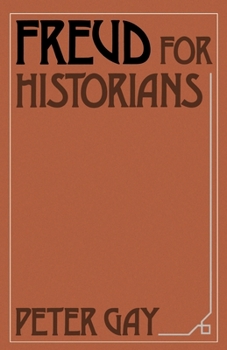Freud for Historians
Select Format
Select Condition 
Book Overview
Is psychoanalysis a legitimate tool for helping us understand the past? Many traditional historians have answered with an emphatic no, greeting the introduction of Freud into historical study with responses ranging from condescending skepticism to outrage. Now Peter Gay, one of America's leading historians, builds an eloquent case for "history informed by psychoanalysis" and offers an impressive rebuttal to the charges of the profession's anti-Freudians...
Format:Paperback
Language:English
ISBN:019504228X
ISBN13:9780195042283
Release Date:December 1986
Publisher:Oxford University Press
Length:272 Pages
Weight:0.65 lbs.
Dimensions:0.7" x 5.6" x 8.5"
Customer Reviews
2 ratings
For historians more than really radical thinkers
Published by Thriftbooks.com User , 20 years ago
While FREUD FOR HISTORIANS by Peter Gay is primarily about historians and the interplay between professors in that field and psychoanalysis, my own interest in maintaining a polymorphously perverse view of my own history, including the intellectual interactions inspired by Nietzsche, Freud, and Walter Kaufmann, who had written a trilogy including books on Goethe, Nietzsche, and Freud at the time of his death in 1980 in a quest to apotheosize a few worthy thinkers, leads me to attempt to examine the six major arguments presented in FREUD FOR HISTORIANS (1985) as applying to my own fractured self. Nietzsche wrote like an author who was not as concerned about saying anything soothing to those who read to relax, as he chose instead to illustrate the danger of saying too much. Walter Kaufmann had been born in Germany in 1921 but aptly came to the United States and served in military intelligence during World War II, then translated many of Nietzsche's works and the poetic drama Faust (1961) by Goethe into English as a professor of philosophy in a country that was so un-German, it had hardly been paying attention. Chapter One of FREUD FOR HISTORIANS is called Secret Needs of the Heart, and the strangest secret need which Nietzsche confessed was for music. Plato as anti-poet philosopher started a long line of professors who would consider popular songs a reflection of the most trivial ideas of their time, but few professors openly considered the possible emotional impact of rock 'n' roll in wartime. I myself felt like the American alter ego of Walter Kaufmann on that subject, eager to guess what his twenty favorite songs might be if he ever heard them. Freud might have liked more of those songs than Walter Kaufmann did, and the jokes which Freud discussed in `Jokes and their Relation to the Unconscious' (S.E., VIII, 9n is quoted by Gay on p. 59) were no less ironic than lines in some great popular songs, once the ice on that subject had been shattered and plunged through. Peter Gay writes about "the guilt feelings of parricide" (p. 12) and answers sought "in politics, in day-to-day events." (p. 13). Professors who do not write about anything this weird are unlikely to confess that they have a lot to learn. Chapter 2, The Claims of Freud, considers terms Freud used to illustrate mental aberrations, "regression and repression, projection and denial, ambivalence and transference and the rest of his professional vocabulary, as precise descriptions of very real mental acts." (p. 43). People who consider history the result of the interaction of grandiose fantasies, no matter what position intellectuals choose to expound or condemn, even if those who act in historical roles have a "growing suspicion that Freudians are not better than religious fanatics, a tribe of true believers" (pp. 43-44), will have little trouble agreeing with Nietzsche's explanation of How the True World Finally Became a Fable (THE PORTABLE NIETZSCHE, pp. 485-486). Gay explai
A clever book
Published by Thriftbooks.com User , 25 years ago
This study is of major importance in psychohistory. With an elegant style and in very clever and intelligible words, Gay is summarizing a century of psychology since Freud, and its influence on history-writing. Though this study is a summary, this book never loses his wit and ridicule, and because this book carries a thesis (you can use psychology when you're an historian), which is already suggested in the title, 'Freud for Historians' is written in a defensive and coherent style, which is pleasant to read. Because much of all this is still in debate, this book is sure worth reading.






